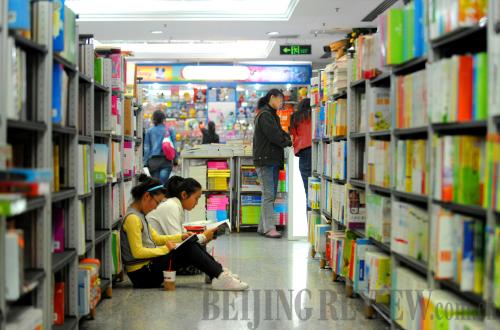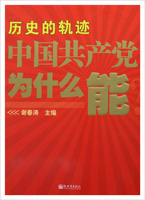|
Why are they reading?
 |
|
JOY IN READING: Readers select and read books in Beijing Books Building on April 5, 2011 (CFP) |
On the best-seller list of China in 2010, most were books about investment, financing and romantic novels. Statistics provided by the Chongqing Library show what is considered literature sits stably on top of its lending list in the first quarter of 2011.
"Reading for practical use is very common nowadays. From the usage of the books in the library, you can see students mostly read books related to exams and English learning; elderly people prefer books about health. The middle-aged have so little spare time for reading, they often just browse or read for temporary use," said Shi Huan, Assistant Chief Librarian of the Shanxi Library. "With the high pressures of life, reading purely for joy is diminishing. Reading is becoming more utilitarian. "
Zhu Haimin, former Chief Librarian of the Zhejiang Library, said readers in libraries were only a small part of the reading public. But it is hard to say utilitarian reading is prevailing just because of this. "There is no specific way of or aim for reading. Reading for exams or for work is a way to acquire information. We cannot simply say getting practical information for work is utilitarian while reading literature and philosophy is not," Zhu said.
What one should read is a big problem that puzzles most readers. Though there are various kinds of book lists, their role is limited. It is reported there are more than 300,000 kinds of books are published in China every year. It is really not so easy to find books suitable for particular readers. It is not only a puzzle for readers, libraries also feel confused when they select and purchase books.
"Usually, I search for evaluations of the book on the Internet and then choose those I am interested in and highly rated ones. But I might occasionally buy books I dislike," said Ma Qian, an office worker in Beijing. Ma continues buying and reading books, though he finds it is really hard to choose books that suit him. "Time for reading is so limited and precious. If I can't find suitable books I choose to read classics."
Li Xining, Assistant Chief Librarian of Shandong Library, said classics were becoming more popular and his library paid great attention to buying these types of books. "It is delightful to see people reading classics, but it also reflects existing problems in the publishing industry," Li said.
Book on CPC Published
 |
|
The cover of the book (WEI YAO) |
By YUAN YUAN
A book that answers 13 questions about how the Communist Party of China (CPC) works in China and why the Party has made great achievements in the past decades has been recently published by the Beijing-based New World Press.
The book, named Why and How the CPC Works in China, puts forward a new way of introducing China and the CPC to the world.
Xie Chuntao, the author of the book and a professor with the Party School of the Central Committee of the CPC, writes in the foreword that since China has been developing rapidly in recent years, the topics such as "China model," "China's road" and "China's experience" are being discussed a lot at the international level. Why has this happened? Xie and the co-authors of the book raise and discuss 13 questions of the CPC's history and its way of governing the country.
"We provide the answers in a story-telling way," said Xie. "Unlike other academic books, we lead the readers to draw conclusions by themselves from the stories."
Zhao Qizheng, the spokesman of the National Committee of the Chinese People's Political Consultative Conference, said in his review of the book, "This book records the whole process from the foundation of the People's Republic of China to the modern construction of the country. I have been involved in the process, and this book's stories recall many of my memories. For many people in other countries, who have misunderstandings about the CPC, this book is definitely a must read."
| 